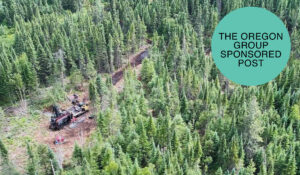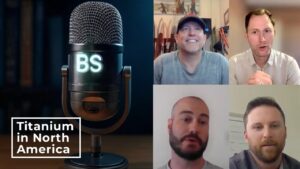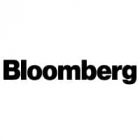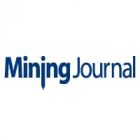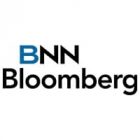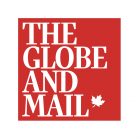Subscribe for Investment Insights. Stay Ahead.
Investment market and industry insights delivered to you in real-time.
On March 16, 2024, Niger’s military government announced it was breaking off with immediate effect its military cooperation with the US and revoked a military accord that allows US bases on its soil.
The announcement came just days after a tense meeting between Niger’s military junta and US officials, where US officials reportedly expressed concern over Russia’s escalating military presence in the country and attempts to renegotiate mining contracts to use as energy blackmail against the West. (Russian military instructors arrived in Niger with a state-of-the-art air defence system in March)
“I think at [an] accelerated pace, the Russian Federation is really trying to take over Central Africa as well as the Sahel… “[A] number of countries are at the tipping point of actually being captured by the Russian Federation”
— Marine Corps General Michael Langley told the Senate Armed Services Committee
This matters for critical minerals: Niger is the world’s seventh biggest producers of uranium, the main fuel for nuclear reactors, and France’s second largest supplier. Yet, in January, Niger temporarily suspended the granting of new mining licenses.
Niger is just the latest example of how Russia’s growing influence in African countries threatens the West as it tries to secure its critical mineral supply chain. For example, US troops are also set to withdraw from neighboring Chad.
Africa holds 30% of the world’s mineral reserves, many of which are crucial for renewable low-carbon technologies.

For example, Russia has extracted an estimated US$2.5 billion of gold from Africa through the Kremlin-linked private military company (PMC) Wagner since 2022.
Why is Russia focused on Africa?
- bypass sanctions: gold and diamonds offer Russia a way to bypass economic sanctions imposed since the invasion of Ukraine – and Africa holds 40% of the world’s gold reserves and the largest reserves of diamonds
- geopolitical leverage: new Russian military and political alliances help diminish Western influence with African countries. In particular, Russia is offering regime survival packages in exchange for the right to extract natural resources
This is important for the West, not just because the region is NATO’s southern flank, but because of Africa’s increasingly important role in the global energy transition to meet net-zero targets and secure critical mineral supply chains independent of China.
For example, to meet the expected rise in global demand, the World Bank estimates production of minerals and metals such as lithium, graphite and cobalt will need to increase by nearly 500% by 2050. This cannot be achieved without Africa’s resources.
Subscribe for Investment Insights. Stay Ahead.
Investment market and industry insights delivered to you in real-time.
Africa’s critical minerals
To give a sense of the scale of Africa’s mineral wealth:
- Africa has 40% of the world’s gold and up to 90% of its chromium and platinum
- the largest reserves of cobalt, diamonds, platinum and uranium in the world are in Africa
- the Democratic Republic of the Congo (DRC) holds 51% of the world’s cobalt reserves, valued at US$133 billion
- Zimbabwe’s lithium reserves are valued at US$10.8 billion, and Zambia’s copper reserves at more than US$156 billion
- there is also vast untapped potential beneath the surface. Despite having 30% of the world’s mineral reserves, Africa counts for less than 10% of global mining spend exploration. For instance, untapped deposits of raw minerals in DRC are estimated to be worth more than US$24 trillion

The US is looking to Africa to loosen China’s stranglehold on battery metals and reduce Russia’s influence over the market for other minerals, US Deputy Treasury Secretary Wally Adeyemo says:“Africa is going to play a huge role. A lot of critical minerals are located here.”
Russia’s activities are a very real threat to the West’s efforts to diversify and secure supply of critical minerals.
Russian private military groups in Africa
Russian private military companies (PMCs) have a substantial presence in the Central African Republic (CAR), Sudan and South Sudan. They are also present in the Congo, Gabon, Libya, Mali and Madagascar, according to research organization, RAND. And now, also Niger.
At least seven PMCs have carried out a minimum of 34 operations in 16 African countries since 2005.

The most well-known PMC, the Wagner Group, was founded in 2014 by Russian businessman Yevgeny Prigozhin. Between 2014 and 2023, it received contracts worth over US$10 billion from the Russian government. At the time of Prigozhin’s death in August 2023, there were around 5,000 members stationed across the African continent. Reorganised and rebranded as the Expeditionary Corps or Africa Corp, Russian military intelligence now runs the group. Through these PMCs, the Russian government is continuing its interest in maintaining a presence in Mali and the wider region.
And, arguably most concerning for mining companies and critical mineral supply chains, internal Russian government documents seen by the BBC detail how this new “Africa Corp” is working to change mining laws in West Africa. This involves rewriting the laws in a way that restricts access to a country’s natural resources — and creates uncertainty over how the revised regulations will impact international mining companies.
For example, in Mali, mining laws were recently rewritten to give the junta greater control over natural resources, including:
- government can take a 10% stake in mining projects and the option to buy an additional 20% within the first two years of commercial production
- state and private Mali interests have the option to own up to 35% in new mining projects, from up to 20%
- and certain tax exemptions have been abolished
As a result, one Australian lithium mine suspended trading in its shares, citing uncertainty over the implementation of the new regulations.
The Russians are trying to achieve similar concessions in Niger. The military government has ordered an audit of the sector following its decision to suspend the granting of new mining licenses in January. This will stop French access to Niger’s uranium mines.
If Russia manages to take control of the uranium mines of Western Africa, Europe could again be exposed to the so-called Russian “energy blackmail”, according to Jack Watlingu, a land warfare specialist at the Royal United Services Institute.
Changing mining laws in one country has the potential to spill over into countries looking for a similar arrangement in terms of influence and leverage but have not necessarily brought in Russian military assistance.
This combination of military assistance and business diplomacy in natural resources for regimes is not new. It’s the reactivation of networks established during the Cold War across the continent.
What is the attraction for African countries?
Minerals act as a currency for governments looking to consolidate their power through paramilitary services. Russia offers security services, disinformation services and terrorization of the civilian population, in exchange for lucrative mining contracts. Its military support helps to prop up contested regimes. And, unlike the West, human rights, democracy and the rule of law is not an issue for Russia.
Subscribe for Investment Insights. Stay Ahead.
Investment market and industry insights delivered to you in real-time.
African countries where Russian PMCs have a foothold
Some of the most significant countries where Russia has an influential foothold are Central Africa Republic (CAR), Niger, Libya, Mali and Burkina Faso. Examples of Russian influence include:
- Russia’s PMCs helped train Sudan’s military against South Sudan, as well as to help protect the country’s gold, uranium and diamond mines
- in Central African Republic(CAR), through Midas Resources, Wagner manages its preferential mining access to CAR’s Ndassima gold mine, with an estimated US$2.8 billion of reserves
- in Sudan, data from the Sudanese Central Bank leaked to CNN suggests that as much as 32.7 tons of gold were unaccounted for in 2021, citing Wagner smuggling as the primary source of this deficit. At a market rate of US$60 million per ton of gold, Wagner could have earned as much as US$1.9 billion according to recent report
- PMCs backed the military coup in Niger, which is now in power
- the military junta in Mali has paid Wagner more than US$200 million since 2021, much of it from gold mining, according to US Intelligence. Then, in November 2023, the Malian military, assisted by Wagner, captured the rebel stronghold of Kidal, a gold rich region
- PMC activities in Libya include aiding General Khalifa Haftar’s offensive against the UN-backed government in Tripoli
- in February 2023, the authorities in Burkina Faso requested nearly US$30 million in gold from its mines to be handed over for “public necessity” — a sign that the country could be moving closer to Russia and its PMCs


It’s also worth noting the relationship between South Africa and Russia, forged during the Cold War when the Soviet Union backed the ANC’s fight against apartheid, has also come under scrutiny in the last few years. In 2022 Pretoria didn’t not condemn the invasion of Ukraine and in March, Russian President Vladimir Putin briefed South African President Cyril Ramaphosa by phone on the situation in Ukraine. Crucially, the Kremlin says that the two leaders also discussed cooperation in energy and trade.
Russia already has an official mining presence in numerous African countries. For instance, Russia’s diamond mining company Alrosa is well established in Angola, Zimbabwe and, more recently the DRC. Rusal is exporting bauxite from Guinea that is mined in its Dian-Dian operations. The presence of Russian mining companies per se is not an issue, but their relations with PMCs and African governments raises serious concerns.

In CAR, the links between the activities of PMCs and mining companies M Finans (based in Russia) and Lobaye Invest (based in CAR) reveal the nature of some such ties. In 2018, licenses to exploit diamond and gold deposits were awarded to a Russian company believed to be close to Prigozhin.
Is the West’s response failing?
Russia’s military scramble for Africa is gaining ground. For example, both the US and France are in retreat in Niger.
However, economically, it’s a very different story. US and Western trade and investment is much higher than Russia’s financial investment.
In 2023, there was an estimated value of US$14.2 billion in new two-way trade and investment between US and African countries. Less than 1% of Russia’s foreign direct investment goes to the African continent, and its US$18 billion in trade lags far behind the America’s US$64 billion.
According to UNCTAD’s World Investment Report 2023, European investors are the largest holders of FDI stock in Africa: United Kingdom (US$60 billion); France (US$54 billion); the Netherlands (US$54 billion).
This Western investment includes official mining contracts. For example:
- KoBold Metals, backed by a coalition of billionaires including Bill Gates and Jeff Bezos, has been drilling at the Mingomba copper mining project for little over a year. KoBold plans to have the US$2 billion underground copper mine ready for production in the early 2030s
- the US speaks regularly with the Democratic Republic of Congo’s state miner Gecamines, as Washington seeks to deepen relationships with key suppliers of cobalt and copper across the African continent
- conversations center on supply deals and potential new mines. In February, Singapore-based Trafigura and Canada’s Ivanhoe Mines signed a major deal to export copper along a US-backed rail route from the DRC
Conclusion
Just as the West is trying to secure critical mineral supplies from around Africa and cut its reliance on China, it faces a new threat.
African countries are prioritizing themselves, and not necessarily in a way that favors Western interests. We’ve been here before with the Cold War when Africa was a region of proxy wars between the USA and USSR.
This time — for now — it is the West who are on the back foot. Traditional Western levers of influence across significant parts of the continent are not working.
Niger, for example, is the largest recipient of State Department military assistance in West Africa. A blockade after the coup by the regional economic bloc ECOWAS was lifted in February and the bluff of a threat of military intervention by neighboring Nigeria was called. What’s more, French troops have left after more than a decade of anti-jihadist operations.
So far, nothing has worked and Western efforts have only deteriorated relations with Niger. The loss of influence means Europe is vulnerable to a potential loss of uranium supply which would tighten supply across the world.
Russia’s military scramble for African critical minerals poses a serious challenge to the West’s efforts to secure critical mineral supply chains and reduce dependence on China, which is making it’s own significant play into the continent.
However, Africa is a continent of many different countries and interests. Not every country is interested in Russian (or Chinese) influence — but such interest gives countries in Africa more leverage in negotiations with the West.
We don’t think Western interests are about to be forced out from across the continent, but African governments have new options for military and financial support, so if the West want access to the continent’s resources, they must be able to adapt to the new dynamics and offer a better deal.
Subscribe for Investment Insights. Stay Ahead.
Investment market and industry insights delivered to you in real-time.










